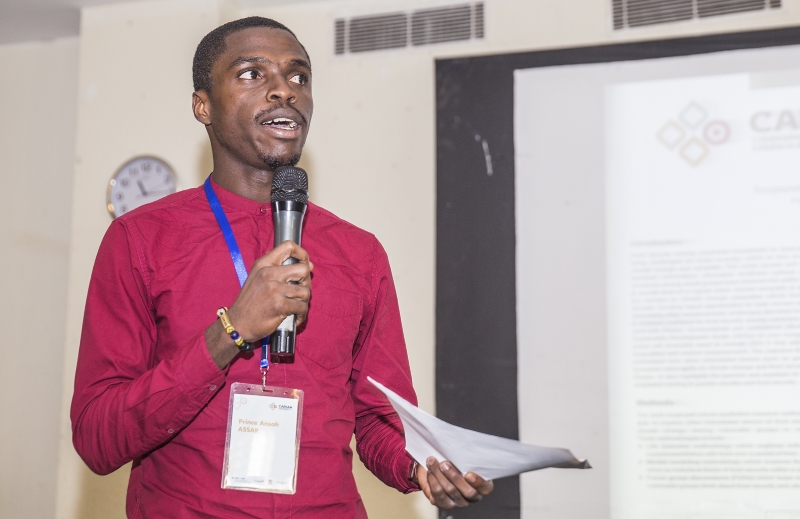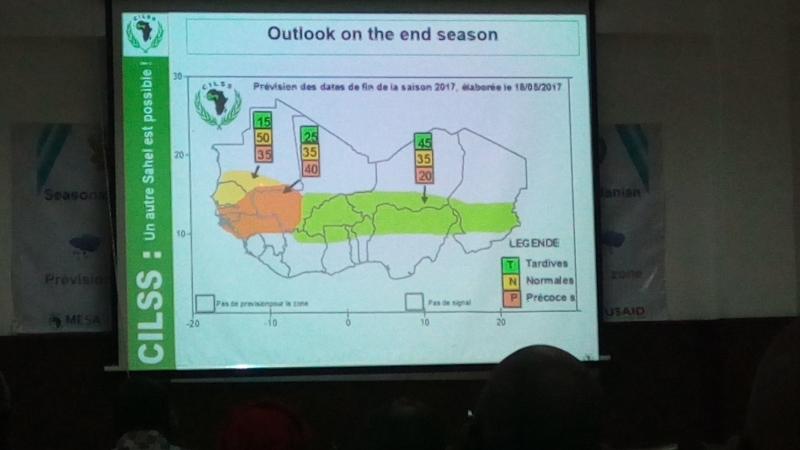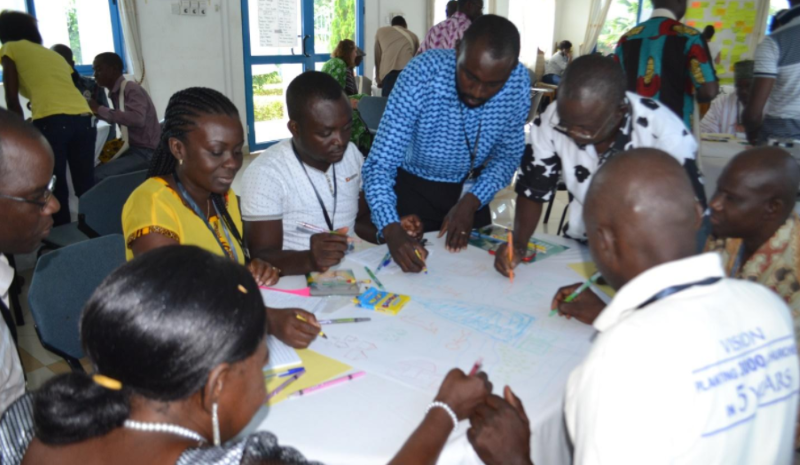ASSAR Ghana attends the 4th PRESASS Regional Climate Outlook Forum in Accra

By Prince Ansah
PRESASS (PRÉvisions climatiques Saisonnières en Afrique Soudano-Sahélienne) is a regional forum that focuses on regional and seasonal rainfall expectation for West Africa. The event, which was organised by Agrhymet Regional Centre of Niamey, the African Centre of Meteorological Applications for Development (ACMAD) and the Ghana Meteorological and Hydrological Agency, was held in Accra, Ghana from 15-19 May 2017. The event brought together experts from agro-hydro-climatic information centres, representatives of river basin organisations, the disaster risk reduction community, and humanitarian aid agencies working in 17 countries in the sub-region.
The ASSAR team had the opportunity to participate and make a presentation at the event. Prince Ansah (Technical Officer, ASSAR) presented on behalf of the team using some outputs from ongoing research work that related to the theme of the forum. His presentation emphasised the need for timely and accurate weather information for ensuring agriculture and food security boost at the local level. The presentation became relevant to the overarching outcome of the forum, which produced climate user-relevant information that reduces climatic risk, enhances the sustainable development goals, and supports key sectors of the sub-regional economy.

Prince Ansah (Technical Officer) presented on behalf of the ASSAR team at PRESASS. (Photo by Jitendra Raj Bajracharya)
The specific outcomes of the forum that had implications for ASSAR Ghana theme and study sites
In Nandom and Lawra districts of the Upper West region, the ASSAR Ghana team is focused on addressing agriculture and food security challenges for vulnerable communities. This event highlighted some specific outcomes that had direct implications for farmers in ASSAR study sites.
The northern part of Ghana, including Upper West region and central Mali, will receive above average cumulative rainfall and longer than normal dry spells during the second half of the rainy season. Longer dry spells could affect planting, growth and crop yields at the end of the season.
Again, the Upper Volta River basin including the Black Volta will receive above average flows relatively to the past 30 years. This implies that vegetable farmers along the Black Volta may suffer from flooding of farms, which is a regular case when there is above average rainfall in the region.
In view of the impacts expected, the forum recommended active measures to address issues related to dry spells and droughts, through promotional market gardening, agroforestry, water-deficit-resistant crop varieties, the use of supplementary irrigation and alternative livelihood sources.
For flood prevention, farmers are advised to collaborate with the community or district agro agencies that provide weather and climate information for seasonal planning. The accuracy and timing of weather information for farmers’ use will be useful to build and strengthen trust between the data generators and final users at the local level.

Seasonal outlook for West Africa presented by CILSS. (Photo by Prosper Adiku.)
The conclusions at the forum confirmed the ASSAR Ghana Transformative Scenario Planning (TSP) findings that access to water (including political commitment) is a key issue that will define agriculture and food security in the near future for West Africa. Water security for agriculture purposes will need a collective effort from all stakeholders across the spectrum to manage agriculture-related water crisis. Again, it is imperative for the governance structures in the region to make adequate investments into smart water management systems for agriculture production. Sustainable alternative livelihood support systems, proper ecosystem management, and disaster risk reduction strategies will equally need attention to address agriculture and food security challenges in the region. These were also the issues that stood out during the Ghana TSP process.

Stakeholders working together during the TSP process in Ghana. (Photo by Prosper Adiku.)
The role of ASSAR as a stakeholder is to provide research evidence that supports systems and structures which enable agriculture productivity and at the same time expose barriers that may hinder adaptation efforts in semi-arid regions.
At the forum, the team engaged with some relevant institutions and personalities who were interested in the work ASSAR is doing in northern Ghana. A brief opportunity presented itself to interact with Ghana’s Deputy-Minister for Communications, who promised to link-up the team with the appropriate sectors within the government for engagement and the sharing of emerging research findings. Follow-up engagements are currently being pursued to establish these collaborations, especially on key issues of common interest.
See full report on the Regional Outlook forum.